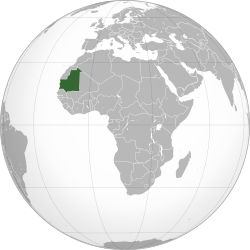Islamic Republic of Mauritania | |
|---|---|
| Motto: شرف، إخاء، عدل "Honour, Fraternity, Justice" | |
| Anthem: النشيد الوطني الموريتاني "National Anthem of Mauritania" | |
 Location of Mauritania (in green) in western Africa | |
| Capital and largest city | Nouakchott 18°09′N 15°58′W / 18.150°N 15.967°W |
| Official languages | |
| Recognised national languages | |
| Other languages | French |
| Ethnic groups | |
| Religion | Sunni Islam (official) |
| Demonym(s) | Mauritanian |
| Government | Unitary semi-presidential Islamic republic |
| Mohamed Ould Ghazouani | |
| Mokhtar Ould Djay | |
| Mohamed Ould Meguett | |
| Legislature | National Assembly |
| Independence | |
• Republic established | 28 November 1958 |
• Independence from France | 28 November 1960 |
• Current constitution | 12 July 1991 |
| Area | |
• Total | 1,030,000 km2 (400,000 sq mi)[2] (28th) |
| Population | |
• 2024 estimate | 4,328,040[3] (128th) |
• Density | 3.4/km2 (8.8/sq mi) |
| GDP (PPP) | 2023 estimate |
• Total | |
• Per capita | |
| GDP (nominal) | 2023 estimate |
• Total | |
• Per capita | |
| Gini (2014) | medium inequality |
| HDI (2022) | low (164th) |
| Currency | Ouguiya (MRU) |
| Time zone | UTC (GMT) |
| ISO 3166 code | MR |
| Internet TLD | .mr |
Mauritania,[a] formally the Islamic Republic of Mauritania,[b] is a sovereign country in Northwest Africa. It is bordered by the Atlantic Ocean to the west, Western Sahara to the north and northwest, Algeria to the northeast, Mali to the east and southeast, and Senegal to the southwest. By land area Mauritania is the 11th-largest country in Africa and 28th-largest in the world; 90% of its territory is in the Sahara. Most of its population of some 4.3 million lives in the temperate south of the country, with roughly a third concentrated in the capital and largest city, Nouakchott, on the Atlantic coast.
The country's name derives from Mauretania, the Latin name for a region in the ancient Maghreb. It extended from central present-day Algeria to the Atlantic. Berbers occupied what is now Mauritania by beginning of the third century AD. Groups of Arab tribes migrated to this area in the late seventh century, bringing with them Islam, Arab culture, and the Arabic language. In the early 20th century, Mauritania was colonized by France as part of French West Africa. It achieved independence in 1960, but has since experienced recurrent coups and periods of military dictatorship. The 2008 Mauritanian coup d'état was led by General Mohamed Ould Abdel Aziz, who won subsequent presidential elections in 2009 and 2014.[8] He was succeeded by General Mohamed Ould Ghazouani following the 2019 elections,[9] head of an autocratic government with a very poor human rights record, particularly because of its perpetuation of slavery; the 2018 Global Slavery Index estimates there are about 90,000 slaves in the country (or 2.1% of the population).[10][11][12].
Despite an abundance of natural resources, including iron ore and petroleum, Mauritania remains poor; its economy is based primarily on agriculture, livestock, and fishing. Mauritania is culturally and politically part of the Arab world; it is a member of the Arab League and Arabic is the official language. The official religion is Islam, and almost all inhabitants are Sunni Muslims. Despite its prevailing Arab identity, Mauritanian society is multiethnic; the Bidhan, or so-called "white moors", make up 30% of the population,[13] while the Haratin, or so-called "black moors", comprise 40%.[13] Both groups reflect a fusion of Arab-Berber ethnicity, language, and culture. The remaining 30% of the population comprises various sub-Saharan ethnic groups.
- ^ Cite error: The named reference
CIAwas invoked but never defined (see the help page). - ^ "1: Répartition spatiale de la population" (PDF). Recensement Général de la Population et de l'Habitat (RGPH) 2013 (Report) (in French). National Statistical Office of Mauritania. July 2015. p. v. Retrieved 20 December 2015.[permanent dead link]
- ^ "Mauritania". The World Factbook (2024 ed.). Central Intelligence Agency. Retrieved 22 June 2023.
- ^ a b c d "World Economic Outlook Database, October 2023 Edition. (Mauritania)". IMF.org. International Monetary Fund. 10 October 2023. Retrieved 19 October 2023.
- ^ "Gini Index coefficient". CIA World Factbook. Archived from the original on 17 July 2021. Retrieved 16 July 2021.
- ^ "Human Development Report 2023/24". United Nations Development Programme. 13 March 2024. Archived from the original on 19 March 2024. Retrieved 22 March 2023.
- ^ Wells, John C. (2008), Longman Pronunciation Dictionary (3rd ed.), Longman, ISBN 9781405881180
- ^ Diagana, Kissima (23 June 2019). "Ruling party candidate declared winner of Mauritania election". Reuters. Archived from the original on 27 June 2022. Retrieved 6 March 2021.
- ^ "First peaceful transfer of power in Mauritania's presidential polls". RFI. 22 June 2019. Archived from the original on 9 April 2022. Retrieved 27 July 2021.
- ^ "Global Slavery Index country data – Mauritania". Global Slavery Index. Archived from the original on 23 October 2014. Retrieved 26 June 2020.
- ^ "Activists warn over slavery as Mauritania joins U.N. human rights council". reuters.com. 27 February 2020. Archived from the original on 10 June 2020. Retrieved 26 June 2020.
- ^ "Mauritania". United States Department of State. Archived from the original on 14 January 2024. Retrieved 18 December 2023.
- ^ a b "Mauritania – The World Factbook". www.cia.gov. Archived from the original on 6 May 2021. Retrieved 27 July 2021.
Cite error: There are <ref group=lower-alpha> tags or {{efn}} templates on this page, but the references will not show without a {{reflist|group=lower-alpha}} template or {{notelist}} template (see the help page).

